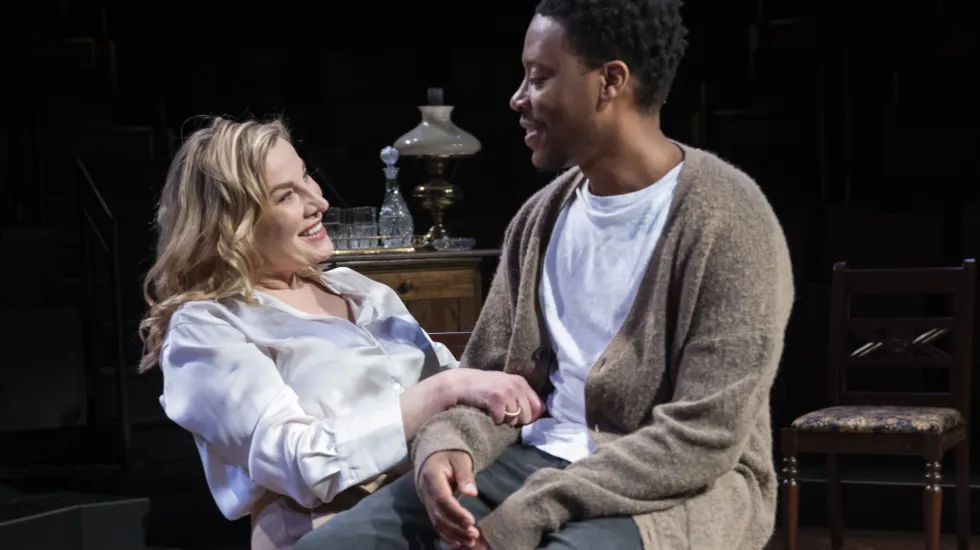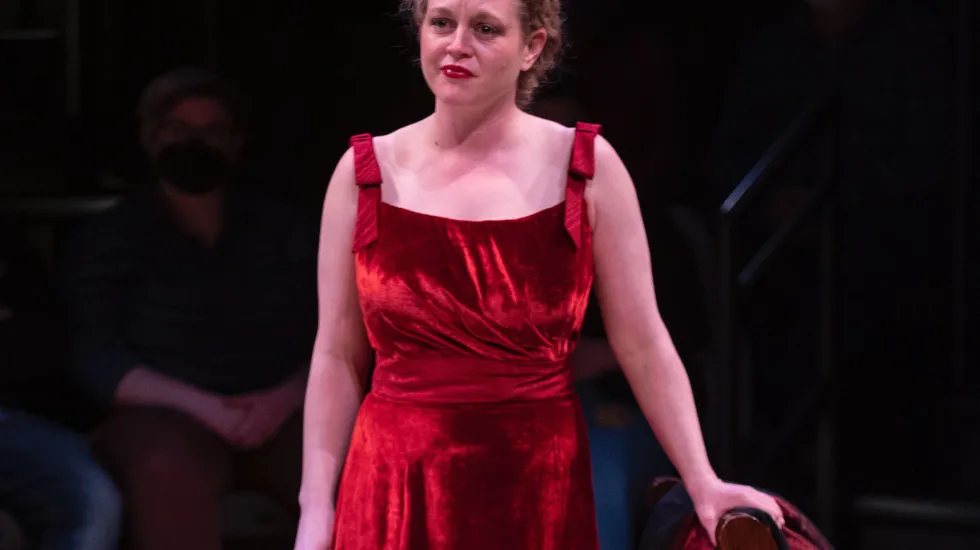
Steppenwolf ensemble member Yasen Peyankov has been working on his adaptation of Anton Chekhov’s “The Seagull” since 2008. As the opener of the new 400-seat theater in the $53 million Liz and Eric Lefkofsky Arts and Education Center, it’s been in the works since pre-COVID days. When the long-gestating production finally opened over the weekend one thing was clear: The wait was worth it.
But before we get to the spare, nuanced, emotionally crystalline staging adapted and directed by Peyankov for the new in-the-round Ensemble Theater in Honor of Helen Zell, a word about the sprawling new center that culminates Steppenwolf’s multi-year, $73 million expansion of its 1650 N. Halsted St. campus.
The good: Nobody in the Ensemble Theater audience is more than 20 feet from the stage, thanks to the in-the-round space designed by Charcoalblue. There truly isn’t a bad seat in the house.
When: Through June 12
Where: Steppenwolf’s Liz and Eric Lefkofsky Arts and Education Center, 1650 N. Halsted
Tickets: $20-$88
Run time: Two hours 30 minutes, including one 10-minute intermission
Info: steppenwolf.org
The brightly lit, expansive lobbies feature two new bars and a maze of red accent walls that provide endless nooks and crannies for socializing and people-watching. The fourth floor Loft space is devoted entirely to Steppenwolf’s myriad educational programs.
And the “History Wall” adjacent to one of the new lobby bars provides intricate display of photos and stage miscellany that follow Steppenwolf’s iconic rise from its legendary humble beginnings in a Highland Park basement to the gleaming new expansion designed by Gordon Gill of Adrian Smith + Gordon Gill Architecture.
The not-so good: If you plan on imbibing in concessions and hitting the loo at intermission, you’d best do some reconnaissance beforehand. Front Bar — several floors down and on the other side of the campus — remains your best bet for menu options, so consider wearing sensible shoes.
As for Peyankov’s succinct, sharp and acerbic take on Chekhov’s tragicomedy, it’s profound and compelling and incongruously funny.
Chekhov gives us three generations of Russians grappling with crises both existential and matter-of-fact. The cost of living is up. Living itself is defined by tedium and unrequited love. Some “Seagull” productions all but need a flow chart to keep the various yearnings straight. Not so with Peyankov’s adaptation, which makes every last flicker of passion, disgust or disinterest as clear as glass.
The plot unfolds at a country home where fabled, larger-than-life actress Irina (Lusia Strus) arrives with her lover Trigorin (Joey Slotnik), a writer of great fame, fortune and abject inability to enjoy either for so much as a moment.
Irina’s son Konstantine (Namir Smallwood) despises his mother’s old-school acting and yearns to create a “new form” of theater arts. Konstantine’s new play is a pretentious, howling emo mess, even though it stars Nina (Caroline Neff), a luminous young teen who dreams of being an actress in Moscow.
There is also a neighboring mother-daughter pair playing out the same sorrow across two generations: Polina (Sandra Marquez) pines for Dorn (Eric Simonson), the town’s vaguely creepy obstetrician. But she marries Ilya (Keth Kupferer), who is consumed with daily business matters and seemingly passionate about nothing. Polina’s daughter Masha (Karen Rodriguez) is hopelessly in love with Konstantin, but marries the soft-spoken, reliable Semyon (Jon Hudson Odom) instead.
Finally, there’s Irina’s ailing brother Peter (Jeff Perry through May 22, Scott Jaeck May 24-June 5), whose malaise is cause for some of Chekhov’s most unsentimental observations about just how small and short our lives are.
The unmistakable sun around which every other character orbits is Strus’ Irina. Strus is at the height of her formidable powers: She’s imperious, glamorous and a brutally frank force of nature throughout, whether delivering a hair-raising monologue on the intersection of love and ownership or dismissing her son as a talentless hack.

Neff’s endlessly vulnerable Nina provides a wrenching counterpoint to Irina, her evolution from starry-eyed teenager to broken adult is dire in its extremity. As Irina’s tormented son Konstantine, Smallwood has a simmering intensity that heightens the tension with almost barometric palpability every time he’s on stage. Rodriguez is captivating as Masha, always cloaked in goth black because she’s in constant mourning for the life she wants but will never have. And Simonson brings a predatory edge to a small-town OB/GYN who prides himself on being “honest” in not acting on his attraction to the women he examines.
The titular shore bird is the obvious yet powerful metaphor throughout. When Konstantine shoots a gull as a gift for Nina, the foreshadowing is on the wall. Characters will briefly soar in this story, before being destroyed by those who consider them as disposable as roadkill.
Most of the dramatic action — two shootings, a pregnancy, a marriage, a pivotal sojourn in Moscow — takes place off stage. Chekhov waggishly seems to be critiquing his own work when Trigorin proclaims that the problem with the theater is that most dramas are little more than orations delivered by people sitting around in living rooms.
That may somewhat describe what Chekhov does in “The Seagull,” but make no mistake. If you’ve ever loved and lost, dreamed of an alternate life or simply longed to get out of the house, this Chekhovian masterpiece will speak to you.







